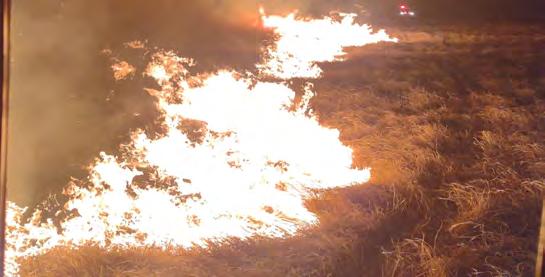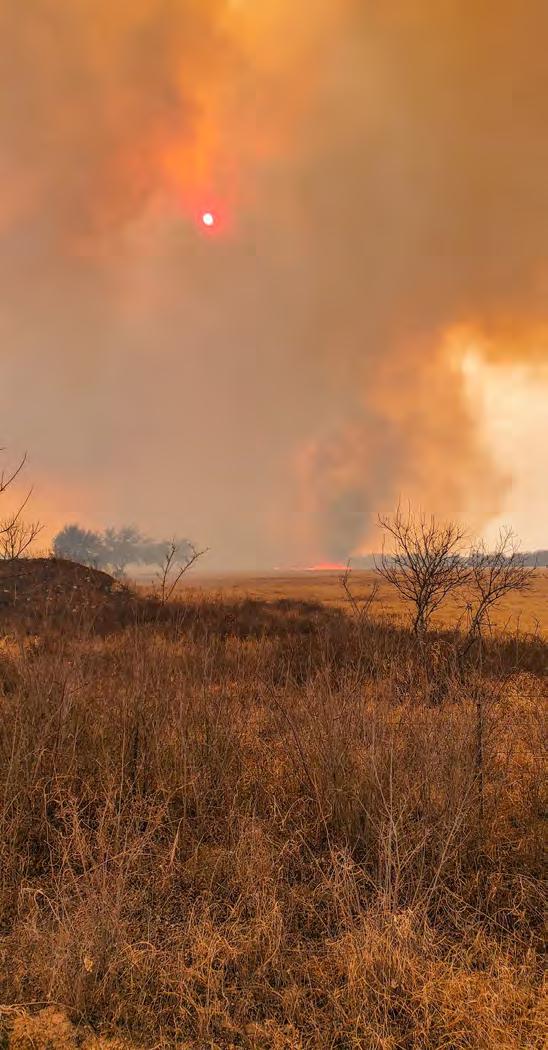
6 minute read
Abilene Inspectors Lend Expertise to Fighting Fires
RRC Pair Volunteers Time with Burkett VFD
If you happen to find yourself in the volunteer fire department in the small North Texas town of Burkett, you will likely run into more than just a few Golsons.
The family of Golsons, including Justin and Travis, are passionate about fighting fires. The brothers, who are both inspectors for the Railroad Commission, have been fighting fires since they were old enough to do so. Their father runs the department, and their wives are also volunteers. “During the recent devasting wildfires in Eastland and other surrounding counties, Justin spent approximately 36 hours and Travis approximately 30 hours actively fighting these fires,” said Tammy Shelton, a team leader for RRC’s Critical Infrastructure Division who previously worked alongside the Golsons in the Oil and Gas Division’s Abilene District. “These gentlemen put their own lives in danger without hesitation every time the call comes in, and without men like Justin and Travis, the rural communities of Texas would be without any fire protection.” Both of the Golson brothers are among many at the RRC who spend time volunteering to help their communities. Texas Government Code §661.905 and RRC policy allows employees who volunteer as firefighters, emergency medical service workers and search and rescue staff to attend up to five days of training per year and can be granted time off for emergency situations. “You don’t do it for the money,” said Justin, who is the Abilene District’s H2S coordinator. “It is about just getting out and helping people.” The area around Burkett, which is southeast of Abilene, is part of the state’s rolling plains and has abundant grasslands and farm fields, which can be subject to wildfires during windy and dry conditions.
That’s partly why the Burkett Volunteer Fire Department, which was created in 2003, is so important to the community. When the need arises, people living in the area come together to help each other out. “It is truly amazing to see people do that, to save a neighbor’s house or a stranger’s house,” Justin said. Without the volunteer fire department, response time would be double or even triple what it is now, the brothers said.
The people who volunteer understand local conditions very well, and the vehicles they use are specific for the terrain.

“A lot of the big departments can’t get off pavement,” said Travis, who is the Abilene District’s cleanup coordinator. “The volunteers are mostly off road.”
Because of the volatile nature of hydrocarbons, fighting fires is also important part of the RRC’s mission of protecting public safety and the environment. Statewide Rule 21 specifically addresses fire protection and is among the items inspectors are looking out for when on oil and gas leases. “When you go to tank batteries, and you are looking at the tanks and there are trees growing over the top, if that tree caught on fire, it could burn up and drop on the tank and blow up the tank,” Justin said. “If you have these pumpjacks with electricity and motors running, and Johnson grass that’s up to your neck, that’s a fire hazard. I had one in which I told the pumper he had to spray his weeds and get that stuff out of there, so it does not pose a fire hazard. When I came back the next time, it was all starting to turn yellow.” When the grass dies, it dries out, which is even more of a fire hazard, he said. The RRC is often called into command centers by the Texas Department of Emergency Management when there are large fires. “Being from the area and from inspecting oil and gas wells, we know where things are,” Travis said. “When we have a fire, we can let incident command know: ‘Look, this is what’s over here. Just keep an eye on it and make sure you do not drive over the top of a flow line when a fire is burning there.’ They may not know there is an oil well in the back of a pasture that has a fire burning through.” It is not just hydrocarbons that pose a threat. In sour oil fields, if hydrogen sulfide is released, the Occupational Safety and Health Administration notes that just 700 parts per million of H2S would knock a person out instantly, and above 1,000 ppm would result in “nearly instant death.”



“Probably a month ago, there was a fire at Pioneer on the old lease we used to pump. We knew the lease was sour,” Travis said, so the district notified the TDEM coordinator about the hazard. “They pulled their resources out for fear if a flow line caught on fire, it could vent sour gas and threaten the firefighters working there.” In that fire, the brothers coordinated with the Texas A&M Forest Service and shared maps of where all the oil wells were. The inspectors also coordinate with oil and gas operators to make sure they are doing what needs to be done to mitigate fire risk. “In the Pioneer fire, I called the pumper and said, ‘Hey, there is a fire out here,’” Travis said. “He immediately went out and start shutting wells in to stop the flow of the gas and the oil. If something did catch on fire, it was just going to burn whatever was in the line and not continuously flow product out. That is one of the major things they do is shut wells in to minimize the amount of product that could be burned.”


Being on the volunteer fire department means they know when something happens, and they use that knowledge as RRC inspectors. “If there is a fire on an oil lease, the operator is supposed to call it in and let us know, and sometimes, they don’t always do that,” Travis said. “A lot of times, it is because they don’t know because they are not out there. When we get the page [as a volunteer fire firefighter], we know it’s there. Then we can start calling operators and say, ‘Hey, your tank battery is on fire or you have a fire burning through your lease. You need to get out here and call the commission and get everything started.’”
Working on a volunteer fire department is not without risks. “You don’t get paid for this,” Justin said. “You don’t get insurance. If you get hurt, you are on your own.” But it is worth it to help the community when it needs it, he said. And with the RRC supporting them, they know they can depend on their salaries and health insurance. The brothers worry that many rural volunteer fire departments are in danger of shutting down because they don’t have new people stepping up to keep them staffed. “We need the volunteers,” Justin said.








